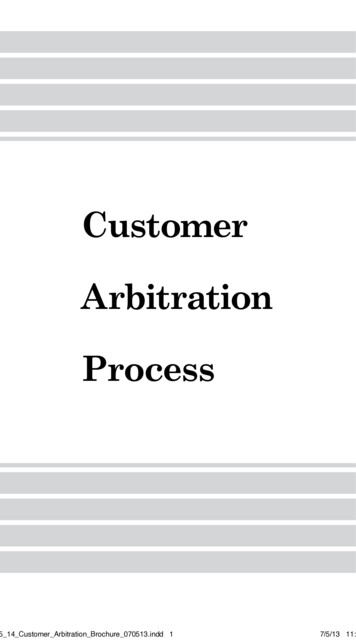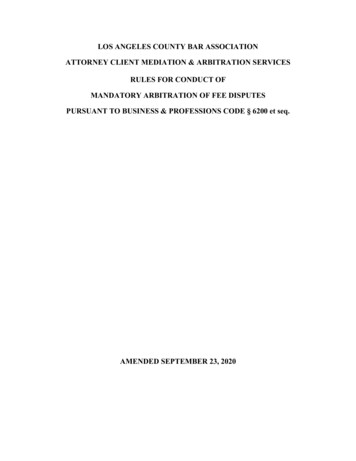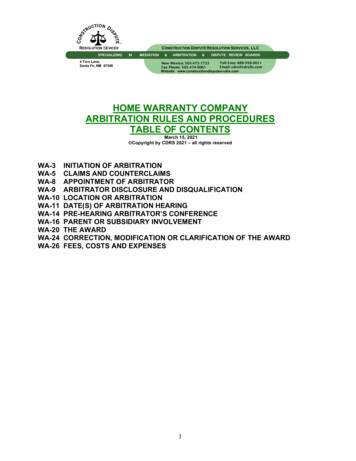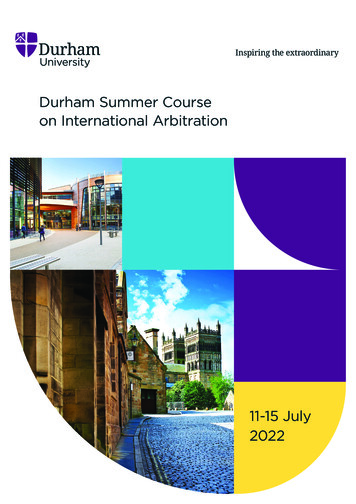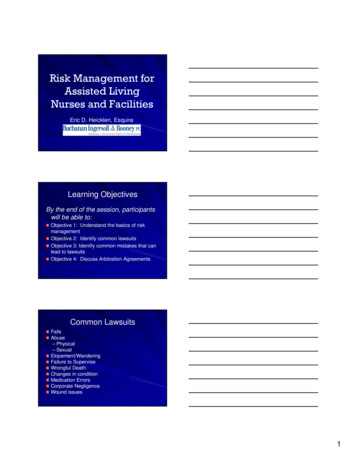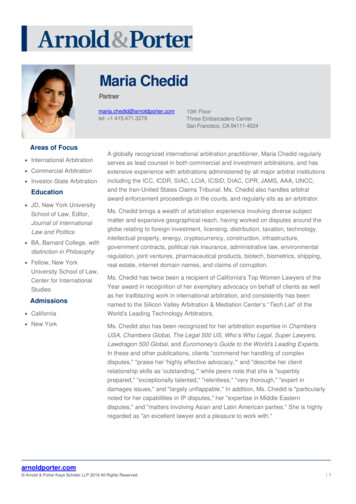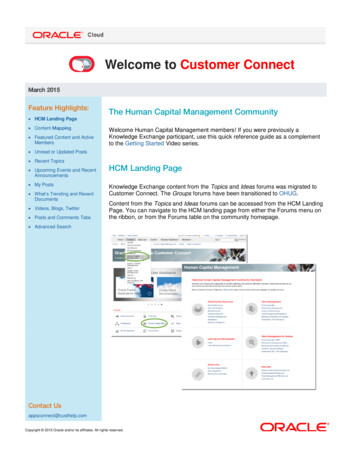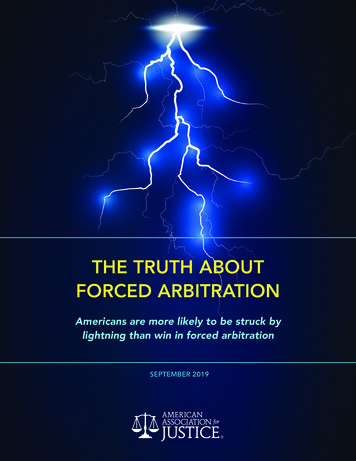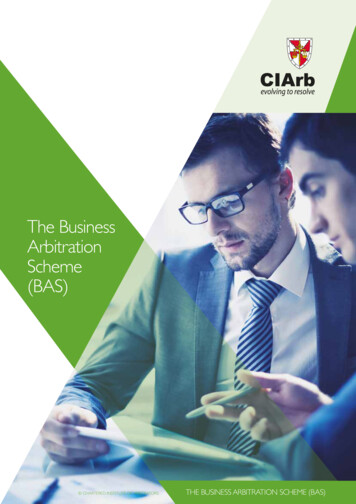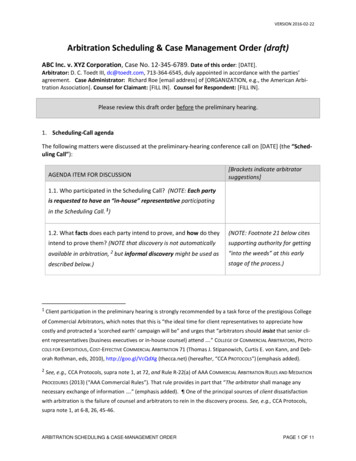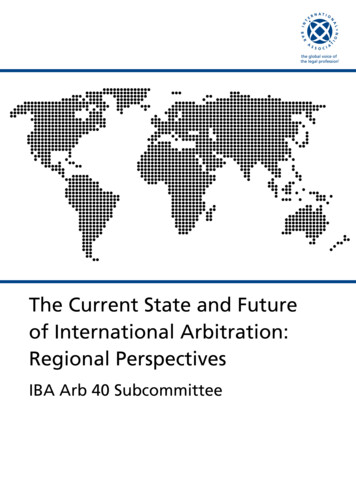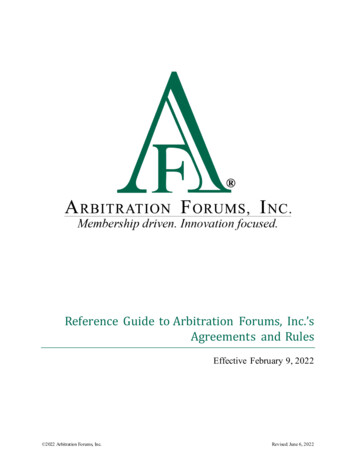
Transcription
Reference Guide to Arbitration Forums, Inc.’sAgreements and RulesEffective February 9, 2022 2022 Arbitration Forums, Inc.Revised: June 6, 2022
Reference Guide to Arbitration Forums, Inc.’s Agreements and RulesEffective February 9, 2022Table of ContentsArbitration Forums, Inc.’s Background . 4Definitions. 7Article First: Compulsory Provisions . 10Automobile Forum. 10Property Forum . 12Special Arbitration . 13PIP Forum . 15Medical Payments Forum . 16Uninsured Motorists Forum. 16Article Second: Exclusions . 18Article Third: Decisions. 23Article Fourth: Non-compulsory Provisions. 25Article Fifth: Arbitration Forums, Inc.’s Authority . 27Article Sixth: Arbitrator Participation . 29Article Seventh: Membership Withdrawal . 30Preamble and Condition Precedent . 31Rule 1-1: Geographical Jurisdiction . 33Rule 1-2: Suit Dismissal and Statute of Limitations. 34Rule 1-3: Monetary Limit . 36Rule 1-4: Impleading . 38Rule 2-1: Filing Process . 40Rule 2-2: Responding Process . 41Rule 2-3: Legal Fees . 43Rule 2-4: Affirmative Pleadings and Defenses/Exclusions . 45Spoliation of Evidence. 48Rule 2-5: Disputing Damages . 49Rule 2-6: Companion Claims. 51Rule 2-7: Pre- hearing Settlement . 52Rule 2-8: Case Restoration after Improper Objection to Jurisdiction. 53Rule 2-9: Reschedule . 54 2022 Arbitration Forums, Inc.2Revised: June 6, 2022
Reference Guide to Arbitration Forums, Inc.’s Agreements and RulesEffective February 9, 2022Rule 2-10: Deferment. 56Rule 2-11: Product Liability Evidence . 59Rule 2-12: Appeal Process (Property and Special Forums). 60Rule 3-1: Notice of Hearing. 62Rule 3-2: Failure to Answer. 63Rule 3-3: Arbitration Panel Size . 64Rule 3-4: Adjournments. 65Rule 3-5: Requirements for Arbitrator Consideration . 66Rule 3-6: Hearing Informality. 68Rule 3-7: Hearing Attendance. 69Rule 3-8: Arbitrator Neutrality . 71Rule 3-9: Post-Decision Coverage Allowances . 72Rule 4-1: No Default Judgments. 74Rule 4-2: Notice of Clerical or Jurisdictional Error. 76Rule 4-3: Decision Publication . 79Rule 5-1: Award Payment. 80Rule 5-2: Unpaid Award Follow-up Process . 81Rule 5-3: Supplemental Damages. 83Rule 6-1: Filing Fees. 84Rule 6-2: Physical Evidence Return . 85 2022 Arbitration Forums, Inc.3Revised: June 6, 2022
Reference Guide to Arbitration Forums, Inc.’s Agreements and RulesEffective February 9, 2022Arbitration Forums, Inc.’s BackgroundThe Federal Arbitration Act of 1925 establishes the validity of agreements to arbitrate disputesarising out of maritime, interstate, or foreign commerce. This statute also allows parties to agreeto arbitrate. Many insurers are signatories to agreements that provide for arbitration. TheUniform Arbitration Act and subsequent state acts further address arbitration agreements. Underthe agreements, the involved parties agree to submit any applicable dispute that may arisebetween them to arbitration instead of litigation. These agreements mandate the disputes theparties must take to arbitration.An effort by the casualty insurance industry to seek arbitration as an alternative to litigationbegan in 1943 in New York. The New York City Claim Managers’ Council appointed acommittee to serve as an arbitration board. Members of the Claim Managers’ Council agreed toarbitrate certain automobile physical damage subrogation claim disputes arising amongthemselves. The arbitration board confined its service to members of the Association of Casualtyand Surety Companies and the National Association of Mutual Casualty Companies inmetropolitan New York.By 1951, the casualty insurance industry throughout the United States recognized the success ofthis New York venture. The insurance companies improved their intercompany workingrelationships by reducing the amount of litigation and the related costs. Due to this local success,the Combined Claims Committee rewrote the original agreement and sponsored it as anationwide program called the “Nationwide Inter-Company Arbitration Agreement”(predecessor to the Automobile Subrogation Arbitration Agreement).During the 1950s, the Combined Claims Committee created two additional arbitration programs.The first program was the International Reciprocal Arbitration Agreement, which expanded theAutomobile Arbitration program to accidents involving U.S. and Canadian insureds. In 1957, thecommittee created the second program with the Special Arbitration Agreement.Although the Combined Claims Committee established Special Arbitration to settle disputesbetween liability carriers of casualty insurance policies, it was to become the cornerstone forcommercial disputes. Participants in commercial disputes may include self-insured businesses orcommercial insureds with large retentions. Under joint and several statutes, a contractualobligation may bind a non-negligent party to a negligent tortfeasor that makes one or bothobligated to pay damage to a third party. The negligent act may be one that causes personalinjury or property damage. The Special Arbitration Forum’s purpose is to determine contributionor apportionment of liability among third-party insurers and to resolve overlapping coveragedisputes. (Effective December 11, 2021, concurrent coverage disputes involving auto damagesbecame compulsory under the Auto forum).Through the early years, the arbitration programs grew to 480 participating companies. By thelate 1960s, arbitration committees were hearing and closing almost 100,000 cases annually. The 2022 Arbitration Forums, Inc.4Revised: June 6, 2022
Reference Guide to Arbitration Forums, Inc.’s Agreements and RulesEffective February 9, 2022development and administration of the arbitration program continued to require more time at theCombined Claims Committee meetings. As a result, in 1967, the Combined Claims Committeetransferred its arbitration sponsorship to an independent committee called the Committee onInsurance Arbitration.In 1970, the Committee on Insurance Arbitration recognized the insurance industry's need for aProperty Subrogation Arbitration Forum. Before the establishment of this Forum, most of theproperty cases involved an automobile hitting a dwelling or business. The AutomobileSubrogation Arbitration Forum heard these cases with the consent of all involved parties. Withthe arrival of the Property Arbitration Agreement, insurers could become signatories and have allof their cases heard in this new Forum.The Committee on Insurance Arbitration represented all segments of the insurance industry. Itincluded companies belonging to three trade associations (Alliance of American Insurers,American Insurance Association, and National Alliance of Independent Insurers), along withcompanies without any trade association affiliation. This insurance arbitration committee becamethe largest system of its kind in the world. Clearly, there was a need to create a legal entity toadminister the arbitration programs.This concern led to the creation of Arbitration Forums, a not-for-profit corporation, to replace theCommittee on Insurance Arbitration. The Committee on Insurance Arbitration incorporated in1981 with the corporate name of Insurance Arbitration Forums, Incorporated. With the formationof the corporation, the Board of Governors of the Committee on Insurance Arbitration becamethe Board of Directors for the new corporation.Insurance Arbitration Forums, Incorporated remained the corporate name until 1986, when theBoard of Directors resolved to eliminate “Insurance” from the name. This change reflected theexpansion of AF’s programs to include arbitration situations outside the insurance companyarena. These additional mediation and arbitration services fulfilled a direct need expressed by theinsurance industry. Because AF always provided an objective, neutral administrative service, theBoard felt the new name would better express its mission and goals.As it grew, AF moved its corporate offices in 1983 from New York City to Tarrytown, NewYork. In 1992, it moved to its current corporate headquarters in Tampa, Florida. During the early1990s, the Board of Directors and management became more responsive to member needs byre-engineering the corporation and developing automation systems.In 2009, AF moved all processing and call center operations to Tampa, Florida. By having all ofthese operations based out of one location, AF created a single management structure providingdramatically enhanced service, consistent processing, accelerated response times, and improvedusability for the membership. 2022 Arbitration Forums, Inc.5Revised: June 6, 2022
Reference Guide to Arbitration Forums, Inc.’s Agreements and RulesEffective February 9, 2022Arbitration Forums has grown from an idea in 1943 to the recognized and respected corporationthat it is today. The corporation is proud of its legacy and constantly strives to achieve thehighest quality in every service offered. We hope that this reference guide attests to this fact. 2022 Arbitration Forums, Inc.6Revised: June 6, 2022
Reference Guide to Arbitration Forums, Inc.’s Agreements and RulesEffective February 9, 2022DefinitionsThe following definitions are provided to ensure consistent interpretation of terms used withinthe various AF Agreements and Rules.Adjournment – An interruption of a hearing at the arbitrator’s(s’) discretion for a maximum of30 days.Affirmative Defense – A complete defense that does not address the allegations, but instead,asserts that a party or the filing is excluded from compulsory arbitration. See also Exclusion.Affirmative Pleading – An issue or legal doctrine that could change how damages are awarded.Examples include bailment and joint and several liability. Might also be raised to address/refutean opposing party’s affirmative defense.Casualty Insurance – (Special Arbitration) An insurance contract that provides indemnity(including UM coverage but excluding UIM coverage) and/or defense to the insured for legalliability arising from an accident, occurrence, or event for which the policy applies, resulting inbodily injury, property damage, personal injury, or advertising injury.Clerical Error – A mistake made by Arbitration Forums’ staff or the arbitrator(s). Examples ofAF staff error include not providing proper notice of filing or not assigning a requested threeperson panel. Arbitrator errors include mathematical errors, switching the parties when recordingthe liability decision, referencing the lack of or need for evidence that was, in fact, submitted,applying, on his/her own, a state regulation or statute from a state other than the loss state, ormisapplying an AF Rule or procedure.Collateral Estoppel – A bar by judgment that precludes the re-litigation of issues litigated bythe same parties on a different or the same cause of action.Commercial Property – (Property Subrogation Arbitration) Coverage for businesses,institutions, or organizations to protect their property and/or business. Commercial Propertycoverage includes, but is not limited to, risks such as fire, burglary, theft, goods in transitcovered by inland marine insurance, floaters, or endorsements.Companion Claim – Any additional claim(s) by or against a participating party arising out ofthe same accident, occurrence, or event, which falls under the same or another coverage group orforum.Concurrent Coverage – Two or more policies of insurance and/or self-insureds providingcoverage to the same party or parties or the same risk or risks for the same accident, occurrence,or event.Construction Defect Claim – (Special Arbitration) Includes both indemnity and expense, paidor prospective. For completed (paid) constructive defect claims, there is a combined award limit 2022 Arbitration Forums, Inc.7Revised: June 6, 2022
Reference Guide to Arbitration Forums, Inc.’s Agreements and RulesEffective February 9, 2022for indemnity and expense of 250,000 per responding company’s insured per project. Aprospective indemnity claim is not eligible for arbitration without consent of all parties. Forprospective expense contribution issues, there is no monetary limit. All claimants (unitresidences) of a construction project, regardless of the manner or number of underlying claims,suits or “companion claims,” shall be considered as one claim for hearing and contributionlimits.Construction Defect Dispute – (Special Arbitration) A dispute among one or more casualtyinsurance companies or entities that are “self-insured” for a construction defect claim involvingcompleted operations resulting in damages to real property for which one or more Insurers orSelf-Insurers provided defense and/or indemnity for the construction defect claim and allege thatone or more other Insurers or Self-Insurers provided concurrent coverage for the sameconstruction defect claim.Counterclaim – A claim resulting from the same accident or loss filed by a responding companyagainst the original filing company under the same coverage group or forum. (Not applicable inSpecial Arbitration)Deferment – A postponement of a hearing for a one-year period from the date of filing, or, fornew Auto filings and TRS PIP and Medical Payments filings from the deferment request date.Denial of Coverage – A company’s assertion that (a) there was no liability policy in effect at thetime of the accident, occurrence, or event, or (b) a liability policy was in effect at the time of theaccident, occurrence, or event, but such coverage has been denied/disclaimed to the partyseeking liability coverage for the claim in dispute. This applies only to a complete denial ofcoverage based on the event in dispute. If the denial is based on what damages the policy covers,i.e., work product, the case will proceed to hearing to determine what damages, if any, arepayable per the policy. A Reservation of Rights letter is also not an affirmative denial ofcoverage.Evidence – All documentary or physical evidence submitted by a party. Parties are not permittedto see an opponent’s evidence, except for evidence related to supplemental damages. Arbitratorsare only permitted to consider evidence properly submitted by the parties.Exclusion - A complete defense that does not address the allegations, but instead asserts that aparty or the filing is excluded from compulsory arbitration.Extension – a postponement of the response due date by the responding party to prepare andsubmit its response. Only one extension may be requested by a responding party; a fee isincurred.Feature - A set of damages from a claim, i.e., a damaged/injured vehicle/person. 2022 Arbitration Forums, Inc.8Revised: June 6, 2022
Reference Guide to Arbitration Forums, Inc.’s Agreements and RulesEffective February 9, 2022Jurisdictional Error – Occurs when an arbitrator fails to rule on an affirmativedefense/exclusion, asserts an affirmative defense/exclusion not pled by a party, renders adecision on an issue not in dispute or over which arbitration lacks jurisdiction, or improperlydismisses a case for lack of jurisdiction where jurisdiction exists.Legal Fees – Attorney fees, court costs, and all other expenses directly related to the prosecutionor defense of a lawsuit.Non-insurer – A “non-insurer member” shall mean a company that is neither a TradeAssociation member nor an insurer member and who has direct financial interest in the claimsbeing arbitrated.Personal Property – (Property Subrogation Arbitration) Coverage to protect individuals fordamage to their property other than automobile. Personal Property coverage includes, but is notlimited to, homeowners insurance, tenant or renters insurance, watercraft or boat ownersinsurance and watercraft endorsements, and personal inland marine coverage.Publication Date – The date AF posts a decision online and it is available to the parties.Recovery Rights – (PIP Arbitration) Legal capacity to regain a loss to another throughsubrogation, reparations, reimbursement, indemnity, or direct action.Res Judicata – A judgment, decree, award, or other determination that is considered final andbars relitigation of the same matter.Reschedule – An extension of the hearing date granted by AF at the request of the party(ies), notto exceed 60 days.Revisit – An option that allows a recovering party to address specific issues raised by an adverseparty regarding a jurisdictional exclusion, disputed damages, a newly impleaded party, andpolicy limits.Self-insured – An entity that meets the legal requirements of being self-insured; one thatassumes the risks directly for covering losses involving its property or one whose deductible orretention is equal to or exceeds the amount of loss in dispute.Settlement – (Special Arbitration) The final disposition of a claim or suit wherein the claimantor plaintiff releases any and all causes of action against all alleged responsible parties involved inthe Special Arbitration filing. Workers’ Compensation subrogation cases do not require asettlement and Uninsured Motorists’ settlements do not require a release of all parties.Written Consent – An agreement to binding arbitration by the party(ies). May be in the form ofa letter, e-mail, etc. Answering a filing without an objection to jurisdiction is considered impliedwritten consent. 2022 Arbitration Forums, Inc.9Revised: June 6, 2022
Reference Guide to Arbitration Forums, Inc.’s Agreements and RulesEffective February 9, 2022Article First: Compulsory ProvisionsSignatory members must forego litigation and arbitrate claim disputes as specified by ArticleFirst of the respective Agreement. A signatory company accepts and binds itself to all of theForum’s Articles and Rules by signing it.With new signatory companies a popular question is whether the accident date determinesjurisdiction of Article First. The date of the loss is not controlling. What controls is the status ofthe claim on the signatory effective date. If it is a pending claim that meets the provisions ofArticle First, it is subject to compulsory arbitration, regardless of the accident date. The key wordis pending. Pending is synonymous from the viewpoint of arbitration with active claims. Closedclaims are excluded, as are claims that have been abandoned prior to a company's decision toparticipate in arbitration. Arbitration Forums specifies pending to avoid an overzealousrepresentative going back in his or her company's archives to resurrect cases long dormant orclosed. The ease with which arbitration can be initiated is not intended to be a vehicle for suchaction. Likewise, claims on which litigation has been instituted and is actually pending when acompany becomes signatory are not considered pending claims. Therefore, they are not subjectto compulsory arbitration.Another point to clarify is each Agreement is independent and all members are not signatory toeach Agreement. Before you file arbitration, make sure the parties are signatory to the specificAgreement in which the dispute is to be filed (unless intercompany arbitration is statutorilymandated).Automobile ForumAn automobile property damage claim within the authority of Article First includes allautomobile property damage claims arising from the payment of losses to an insured, or a selfinsured loss, under the first party automobile coverages. It includes claims arising undercollision, fire, theft, and comprehensive coverages or self-insured losses of a similar nature. Aclaim may include an itemized list of losses such as towing, storage, rental reimbursement, andsalvage expenses, provided they were paid out of the insured’s policy or incurred by a selfinsured pursuant to statute or judicial decision. However, the disputed claim amount cannotinclude a filing company’s normal operating expenses (costs associated with investigating andadjusting claims) or an insured’s out-of-pocket expenses. In addition, diminution in value claimsare only applicable to states where recovery is permitted pursuant to statute or published caselaw, and insurer members pay such claims out of the insured’s policy, self-insured members thatown vehicles incur or pay the damages, self-insured members that lease vehicles (leaseholder)and are responsible, via the lease terms, for the vehicle’s value incur or pay the damages.Examples of disputes resolved in the Auto Forum: 2022 Arbitration Forums, Inc.10Revised: June 6, 2022
Reference Guide to Arbitration Forums, Inc.’s Agreements and RulesEffective February 9, 2022 An insurer pays a diminution in value damages out of the insured’s policy and seeksreimbursement from the tortfeasor’s carrier.A self-insured member that owns vehicles used for normal business operations incurs orpays the damages.A self-insured member that leases vehicles used for normal business operations and isresponsible, under the lease terms, for the vehicle’s value incurs or pays the damages.Examples of disputes not allowed in the Auto Forum: An automobile leasing company seeks diminution in value damages.A self-insured member that leases vehicles used for normal business operations but is notresponsible, under the lease terms, for the vehicles value, or, has not incurred or paid thedamages.Another important point is that the member filed against (responder) under a negligence action isnot limited to an automobile liability insurer. A responder may be a general liability carrier,homeowner’s liability carrier, etc. Any member who may be liable for the Filer’s damages maybe named as a responder.Examples of disputes resolved in the Auto Forum: The driver of a vehicle traveling at an excessive rate of speed collides with anothervehicle that changed lanes without signaling. Insurers cannot agree on the respectiveliability of the two drivers.The liability carrier for an at-fault driver disputes the severity and extent of the damagesalleged by a collision carrier. While liability is conceded, the matter is submitted to theAuto Program for resolution of the damages dispute.A vehicle is damaged because of a malfunction at a drive-thru car wash. The insurer ofthe vehicle seeks recovery from the general liability insurer of the car wash.A rental vehicle is returned by the renter with moderate damage to the right quarterpanel. The renter's collision carrier denies the rental company’s claim for reimbursementbased on contractual primacy, pre-existing condition, or excessive repair costs. Theconcurrent coverage dispute is submitted for resolution.An insurer pays a diminution in value damages out of the insured’s policy and seeksreimbursement from the tortfeasor’s carrier.The following are some examples of claim disputes not allowed in the Auto Forum: An insurer seeks an administrative fee as “costs” for pursuing a claim.An automobile leasing company seeks diminution in value damages. 2022 Arbitration Forums, Inc.11Revised: June 6, 2022
Reference Guide to Arbitration Forums, Inc.’s Agreements and RulesEffective February 9, 2022Property ForumArticle First in the Property Subrogation Agreement broadly describes the disputes that membersmust arbitrate to resolve personal or commercial property claims. The difference betweenpersonal property and commercial property exposures is significant to the point that both aredefined under the Definitions Section (see Chapter 2, Definitions). Commercial propertyincludes losses by businesses, institutions, and other organizations. These losses can originatefrom all types of perils, and the coverage forms can be many types. These might involve inlandmarine, transportation, and traditional fixed coverage forms. Personal property is coverage forindividuals and can take the form of many different types just like commercial property. Thedisputes may concern liability, damages, or both.Some examples of the types of disputes that qualify for Property Arbitration are: A member pays its insured for a fire covered under its homeowners policy. It isdetermined the fire started the first night after the installation of a new furnace. Themember can file in Property Subrogation Arbitration against the insurer of the furnaceinstallation business.An insurer pays an apartment tenant for water damage to his insured property. Thedamage was caused by water leaking through the ceiling from the apartment above. Theinsurer then can file Property Arbitration against the insurer of the tenant above and/orthe landlord’s liability carrier.Two boats collide on the largest lake located in central West Virginia. The boat owner’sinsurer files arbitration against the insurer of the other boat to recover damages sustainedin the accident.A woman has her expensive jewelry covered under a Personal Inland Marine Policy.While staying at a hotel on a business trip, she was forced to quickly evacuate the hotelbecause of a fire alarm. Upon returning to her room, she found that her diamond ring hadbeen stolen. The insurance carrier paid for the loss and filed Property Arbitration againstthe hotel’s insurer.A pizza restaurant caught fire in a strip mall, causing fire damage to the structure andcontents of an adjacent furniture store. The furniture store’s insurer files arbitrationagainst the insurer of the pizza restaurant to recover its loss.An automobile driver loses control while turning at an intersection and drives the c
- (Special Arbitration) An insurance contract that provides indemnity (including UM coverage but excluding UIM coverage) and/or defense to the insured for legal liability arising from an accident, occurrence, or event for which the policy applies, resulting in . response due date by the responding party to prepare and submit its response .
